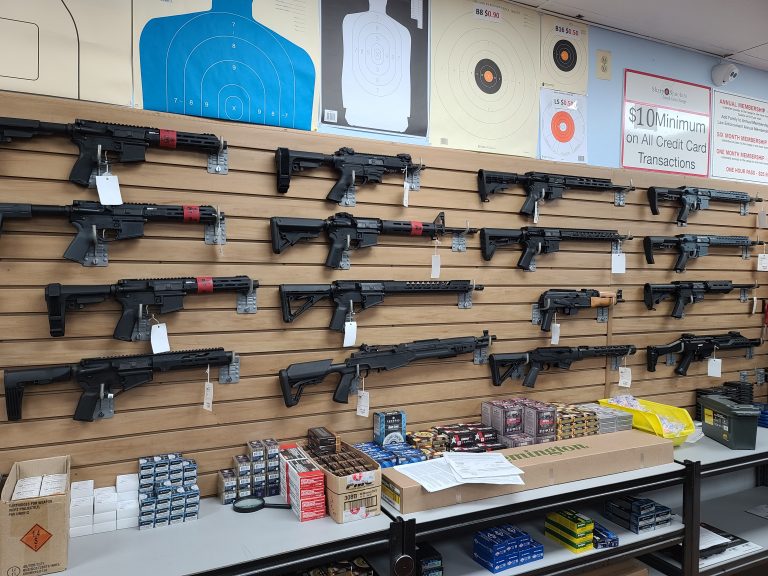Unchastened by two recent failed attempts, Colorado lawmakers are back with another effort to prohibit AR-15s and other semi-automatic firearms. There’s reason to think the third time could be the charm.
The Colorado General Assembly officially gaveled back in Wednesday for the 2025 legislative session. By the end of the day, lawmakers had already introduced Senate Bill 25-003. The “Semiautomatic Firearms & Rapid-Fire Devices” bill would criminalize the manufacture, distribution, transfer, and purchase of any “specified semiautomatic firearm,” defined as any semiautomatic rifle, shotgun, or gas-operated handgun with a detachable magazine.
Essentially, the bill is a reframing of an already novel twist on “assault weapon” ban legislation first floated in the US Senate in 2023. The Gas-Operated Semiautomatic Firearm Exclusion (GOSAFE) Act, introduced by Senators Martin Heinrich (D., N.M.) and Angus King (I., Maine), marked the first legislative effort to ban semi-automatic firearms with detachable magazines while promoting limited-capacity, fixed-magazine alternatives.
The Senators billed it as a more serious alternative to traditional assault weapon bans because it focused on “how these weapons actually work” and the features that “make them especially dangerous” instead of “using the appearance of these guns to restrict them.” However, the language of the proposal targets guns with all kinds of actions rather than just gas-operated guns–despite what the name implies.
Senate Bill 25-003, according to its legislative text and its boosters, takes that concept and reframes it as “enforcement of [Colorado’s] large-capacity magazine ban.”
Though it sheds the GOSAFE Act’s moniker, its influence is unmistakable. The handguns covered under SB 25-003, for instance, are defined verbatim as they were under the GOSAFE Act. It similarly empowers the attorney general’s office with broad discretion to determine which firearm models are banned under the measure. SB 25-003 also goes after rate-of-fire modifications like bump stocks, though it does so in a less sophisticated, more sweeping way than its progenitor.
The banned “rapid-fire devices” under the bill would include any part or combination of parts that have the effect of “increasing the rate of fire of a semiautomatic firearm above the standard rate of fire” for the gun being modified. That could implicate more anodyne modifications, like precision triggers, alongside machinegun conversion kits.
As a result, the bill takes a far broader approach to outlawing common semi-automatic firearms than the traditional features-based bans floated and defeated over the last two years. That suggests it should be bound to have an even more difficult time making it into law than before. Yet, the posture of this year’s legislation conveys a more serious and effective effort is underway.
Whereas two House backbenchers representing the furthest left flank of the legislature carried the previous failed Colorado assault weapon ban bills, neither of whom is in the General Assembly anymore after successful primary challenges, this year’s effort carries more mainstream Democratic support. That includes the imprimatur of the party’s gun-control policy heavyweight.
Senator Tom Sullivan, who became a leading figure in Colorado gun politics after he lost his son in the 2012 Aurora theater shooting, is SB 25-003’s prime sponsor. Notably, Sullivan has cautioned his colleagues against continuing to introduce assault weapon legislation and told the Associated Press he would have voted against last year’s ban bill had it come up for a Senate vote.
This time, however, Sullivan is out front on the effort and is already working to downplay objections to it by attempting to create the impression of a more moderate approach.
“We’re not banning any type of firearm,” Sullivan told a Denver ABC affiliate. “They’re still going to be able to buy all the same kinds of firearms that they were able to buy before. Just that, if it takes a magazine, the magazine must be attached, and the magazine can only be a 15-round.”
That type of sales pitch—suggesting that prohibiting the types of firearms that people commonly buy in favor of theoretical offerings not currently produced anywhere on the commercial market isn’t, somehow, a ban—might come across as highly dubious to gun enthusiasts. But it appears to be working to shore up support among Sullivan’s Democratic colleagues. SB 25-003 was introduced with 18 Senate and 24 House co-sponsors before it had even been scheduled for its first Senate committee hearing.
While it’s not necessarily guaranteed that all original co-sponsors will stay on board once lobbying and public debate begin in earnest, that’s still a far cry from previous efforts that struggled to secure even a single Senate sponsor. 18 Senators also happen to be the exact number needed to ensure a simple majority vote in Colorado’s 35-member upper house, meaning that as things stand, it has the votes needed to clear the legislature.
Of course, Governor Jared Polis (D.) and his views on the matter remain a major wild card. Thus far, his office has again publicly deflected opportunities to provide his thoughts on the bill, much as he did when the two previous assault weapon bans were under active consideration. He has expressed skepticism of broad gun bans in the past, and he even voiced some tepid relief at the second assault weapon ban attempt having failed after the end of last year’s legislative session.
“I’ve always been skeptical about that kind of measure,” he told the Denver Gazette‘s editorial board at the time.
It’s hard to say whether or not his calculus has changed with a bill this year that imposes a more sweeping practical effect but has less PR baggage than a traditional ban. It’s also one thing to express skepticism of a bill that didn’t have majority support in the legislature, but it’s quite another to publicly buck your party with a veto. That factor should trouble any gun-rights advocates counting on the Governor to block its passage.
Ultimately, the biggest hurdle Colorado gun-control advocates face may exist outside the state. Though their effort to pass a sweeping gun ban has the highest odds of success to date, their potential triumph arrives at a time when the possibility of a Supreme Court AR case hangs overhead like the Sword of Damocles.
On Friday, the justices held a conference to discuss whether to take three separate cases regarding state-level bans on semi-automatic rifles and magazines. They could issue orders on the fate of those cases as soon as Monday. Snope v. Brown, one of those cases, represents gun-rights advocates’ best candidate yet for Supreme Court review of whether the Second Amendment protects the weapons Colorado lawmakers seek to ban.
A Snope cert grant and subsequent Supreme Court ruling striking down assault weapon bans would almost certainly scuttle SB 25-003’s attempt to accomplish the same goal by other means.







2 Responses
As someone who lives in rural west slope Colorado, but is represented by two Democrats in the legislature (Roberts, Lukens), it is interesting to note that neither has sponsored this legislation. Lukens voted against the AWB from last year. These gun bans put rural Dems into a sticky situation. As far as I can tell, the legislation would outlaw the Browning BAR big game semi-auto hunting rifles and the like, though semi-auto rifles are explicitly allowed in CPW hunting regulations. A way to allow them would be to remove the restriction on calibers .24 and larger, which are the allowable calibers on Colorado big game. My guess is this is unlikely as these calibers are typically more lethal (more energy) than the smaller calibers. This has always been the issue with focusing on AR .223/556 restrictions- one can argue that the hunting calibers are more lethal. So the legislature is going for broke by outlawing all of them when it comes to semi autos.
It will be interesting to see what amendments, if any, are made to the proposal. Maybe some of those rural Dems will be able to reign in the bill.